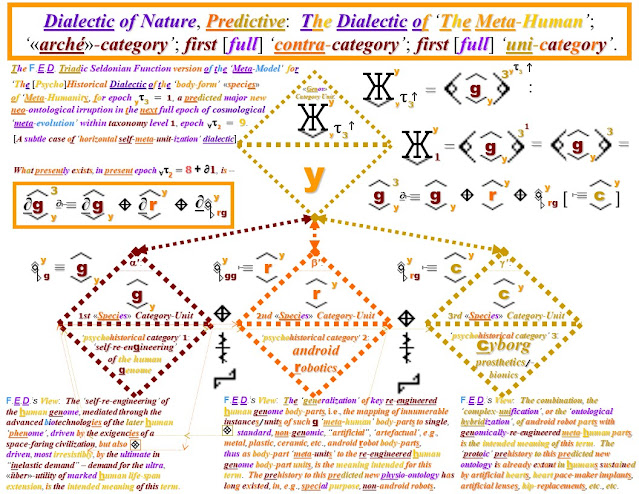
Stephen Hawking on the Advent of ‘the Meta-Human’, II. --
‘‘‘AI Android
Robotics’’’.
Dear Reader,
We have predicted, as the ‘neo-ontology’ of the next epoch of cosmological ‘meta-evolution’ -- at least locally, in our solar system -- an ‘ontologically-dynamical, neo-ontological meta-finite singularity’ that we call ‘the irruption of the meta-human’ -- the advent of a new «genos» of three new «species» of cosmological ontology that we call ‘meta-humanity’ --
qh =
h =
h1, ---> h2 =
h + Deltah =
h + qhh |-= h + y .
h + qhh |-= h + y .
We hold that none of the three, dialectically-interrelated
«species» of this new «genos» of ‘meta-humanity’ that we have predicted is as yet extant in the contemporary Terran ecosphere of [mere] humanity.
We also hold that ‘protoic preformations’ of each of these three «species» are already extant in our times, largely, though
not completely, unnoticed as such by most of our contemporaries.
Given this background, it is interesting to read the
thoughts of the late physicist, Stephen Hawking, on the systematically second of these three «species,
that of ‘‘‘AI Android Robotics’’’,
in his posthumously published, 2018 book Brief Answers to the
Big Questions [Bantam, NY] --
[pp. 184-189]: “... If computers continue to obey
Moore’s Law, doubling their speed and memory capacity every eighteen months,
the result is that computers are likely to overtake humans in intelligence at
some point in the next hundred years.”
“When an artificial intelligence (AI) becomes better than
humans at AI design, so that it can recursively improve itself without human
help, we may face an intelligence explosion that ultimately results in machines
whose intelligence exceeds ours by more than ours exceeds that of snails.”
“When that happens, we will need to insure that the
computers have goals aligned with ours.”
“It’s tempting to dismiss the notion of highly intelligent
machines as mere science fiction, but this would be a mistake, and potentially
our worst mistake ever.”
“...There is now a broad consensus that AI research is
progressing steadily and that its impact on society is likely to increase. The potential benefits are huge... . Because of the great potential of AI, it is
important to research how to reap its benefits while avoiding potential
pitfalls.”
“Success in creating AI would be the biggest event in human
history.”
“Unfortunately, it might also be the last, unless we learn
how to avoid the risks. Used as a
toolkit, AI can augment our existing intelligence to open up advances in every
area of science and society. However, it
will also bring dangers. While primitive
forms of artificial intelligence developed so far have proved very useful, I
fear the consequences of creating something that can match or surpass
humans. The concern is that AI would
take off on its own and redesign itself at an ever increasing rate. Humans, who are limited by slow biological
evolution [F.E.D.: Not
if they take up ‘human-genome self-re-engineering’, as noted elsewhere in this
book by Hawking himself, although such would simply “supersede” contemporary
genomic humanity in a different way.], couldn’t compete and would be
superseded. And in the future AI could
develop a will of its own, a will that is in conflict with ours.”
“Others believe that humans can command the rate of [F.E.D.: development of] technology for a
decently long time, and that the potential of AI to solve many of the world’s
problems will be realised.”
“Although I am well known as an optimist regarding the human
race, I am not so sure.”
“... Little serious research has been devoted to these
issues outside a few small non-profit institutes.”
“Fortunately, this is now changing. Technology pioneers Bill Gates, Steve Wozniak
and Elon Musk have echoed my concerns, and a healthy culture of risk assessment
and awareness of societal implications is beginning to take root in the AI
community.”
“In January 2015, I, along with Elon Musk and many AI
experts, signed an open letter on artificial intelligence, calling for serious
research into its impact on society. In
the past, Elon Musk has warned that superhuman artificial intelligence is
capable of providing incalculable benefits, but if deployed incautiously will
have an adverse effect on the human race. ...”
[pp. 193]: “Why
are we so worried about artificial intelligence? Surely humans are always able to pull the
plug?”
“People asked a computer, “Is there a God?” And the computer
said, “There is now,” and fused the plug.”
FYI: Much of the work
of Karl Seldon, and of his collaborators, including work by “yours truly”, is
available, for your
free-of-charge download, via --
Regards,
Miguel Detonacciones,
Member, Foundation Encyclopedia Dialectica
[F.E.D.],
Officer, F.E.D.
Office of Public Liaison









